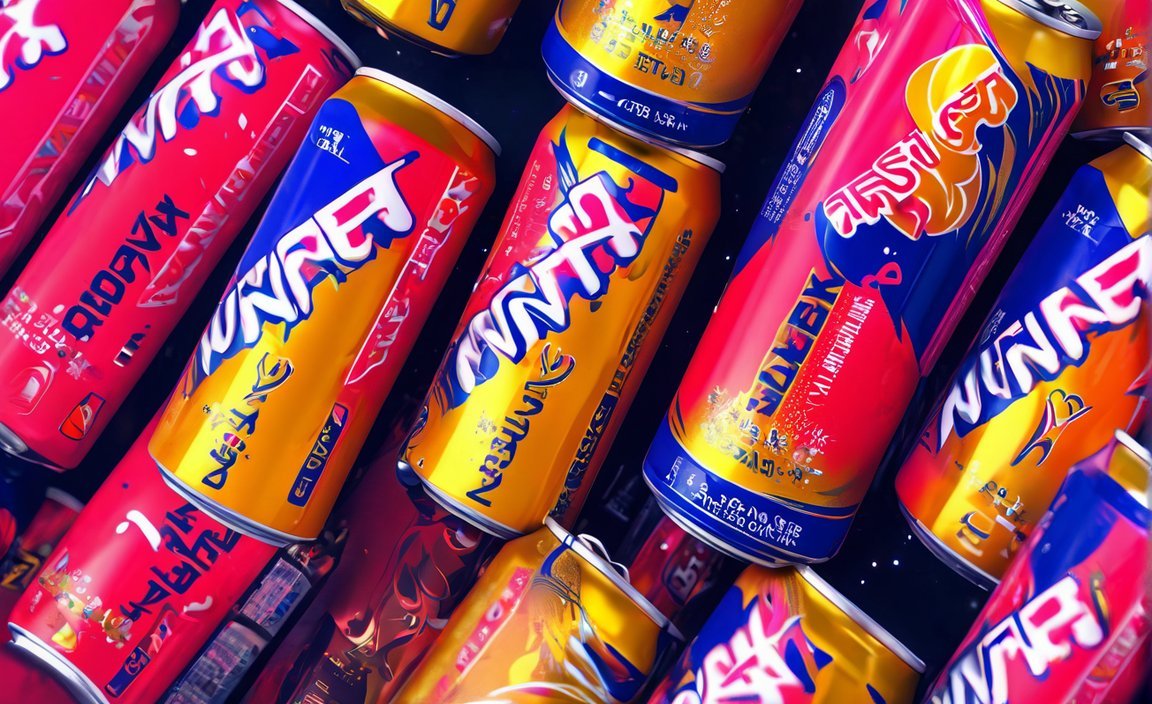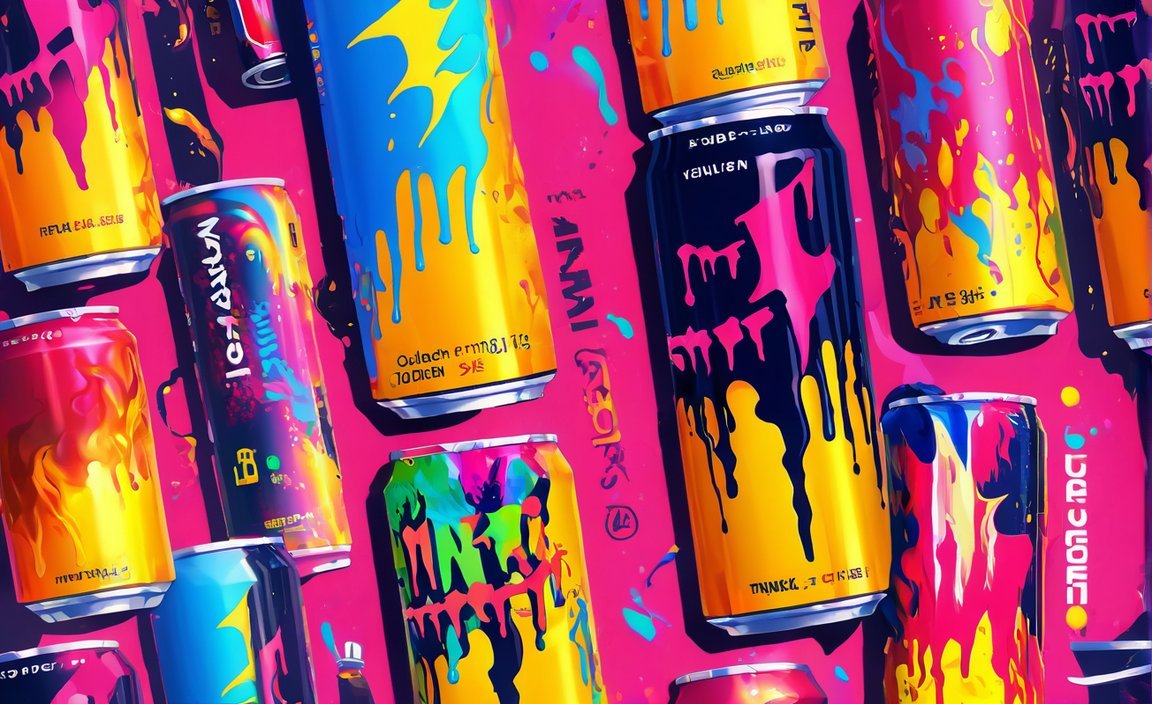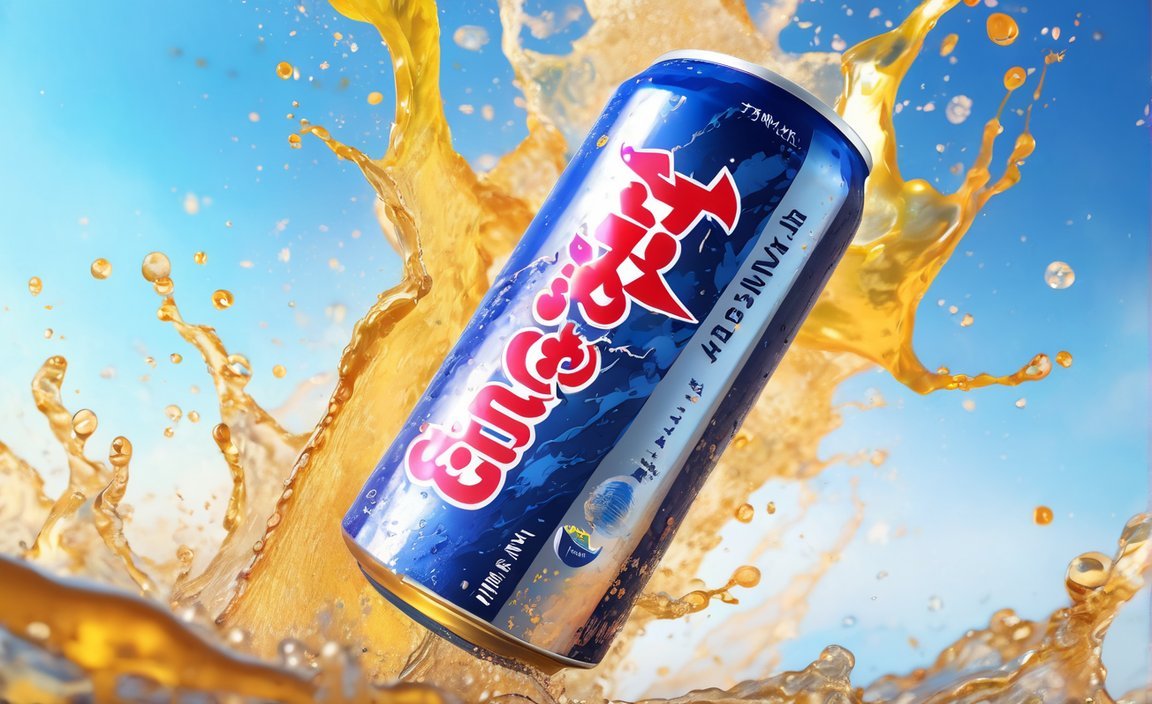Unveiling 10 Facts About Energy Drinks: Ingredients, Risks, and Effects
Discovering the truth about energy drinks is like peeling back the layers of a mystery. With their vibrant marketing and promises of increased vitality, these beverages have become a staple for many seeking an instant boost. But what lies beneath their bold packaging? In this article, we delve into the realm of energy drinks, uncovering 10 essential facts that will shed light on their ingredients, potential health risks, and effects. Through careful research and expert analysis, we will navigate the complexities surrounding these popular beverages, equipping you with the knowledge needed to make informed decisions about your well-being.
Key Takeaways:
- 85% of people in the US consume at least one caffeinated drink daily.
- 25% of college students mix alcohol with energy drinks.
- Men aged 18-24 are the biggest consumers of energy drinks, accounting for 34%.
- In the Czech Republic, 40% of children consume energy drinks.
- The global energy drink market is projected to reach $86.01 billion by 2026.
- Energy drinks are different from sports drinks.
- Energy drinks contain high levels of caffeine.
- Caffeine can have negative effects on children.
- Energy drinks often contain additional ingredients of questionable value.
- Energy drinks should not be consumed by children.
10 Facts About Energy Drinks: Ingredients, Risks, and Effects

Energy drinks have gained immense popularity in recent years, with more and more people turning to them for a quick boost of energy. But do you really know what you’re consuming when you crack open that can? In this article, we’ll uncover 10 important facts about energy drinks that you need to know. So, let’s dive right in!
Fact 1: Caffeine Consumption is Rampant
It’s no secret that caffeine is the main ingredient in energy drinks. In fact, a staggering 85% of people in the US consume at least one caffeinated drink every day. That’s a lot of people relying on these beverages for their daily dose of energy!
Fact 2: Alcohol and Energy Drinks Don’t Mix
Energy drinks and alcohol might seem like a popular combination, especially among college students. However, mixing the two can be dangerous. According to research, 25% of college students engage in this risky behavior, which can lead to increased alcohol consumption and higher risks of accidents.
Fact 3: Energy Drinks Appeal to Young Adults
When it comes to energy drink consumption, young males between the ages of 18 and 24 are the biggest consumers. This trend highlights the need to educate this demographic about the potential risks associated with excessive energy drink intake.
Fact 4: International Energy Drink Trends Vary
Energy drink consumption varies across countries. For instance, in the Czech Republic, a shocking 40% of children consume energy drinks. This statistic is a cause for concern, as children may be more susceptible to the negative effects of energy drink consumption.
Fact 5: The Global Energy Drink Market is Booming
The energy drink market is thriving on a global scale. Experts project that by 2026, the market will reach a staggering $86.01 billion. This skyrocketing growth is a testament to the popularity of these beverages worldwide.
Fact 6: Energy Drinks Aren’t the Same as Sports Drinks
Although energy drinks and sports drinks may appear similar, they serve different purposes. Energy drinks are designed to provide a quick burst of energy through caffeine and other stimulants, while sports drinks aim to replenish electrolytes and hydrate the body during physical activity.
Fact 7: High Caffeine Levels in Energy Drinks
One of the primary concerns surrounding energy drinks is their high caffeine content. While the exact amount can vary, most energy drinks pack a significant caffeine punch. This can lead to adverse effects such as increased heart rate, jitters, and even caffeine toxicity if consumed in excess.
Fact 8: Kids and Caffeine Don’t Mix
Caffeine can have detrimental effects on children, ranging from increased heart rate and blood pressure to disrupted sleep patterns. This is why health experts strongly discourage the consumption of energy drinks by children and adolescents.
Fact 9: Added Ingredients of Questionable Value
In addition to caffeine, energy drinks often contain a variety of other ingredients. Some of these ingredients, such as sugar, artificial flavors, and additives, come with their own set of potential health risks. It’s essential to be aware of what you’re putting into your body.
Fact 10: Energy Drinks Are Not Meant for Children
To reiterate an important point, energy drinks are not suitable for children. The combination of high caffeine levels and additional ingredients can have serious implications for their health. It’s crucial to prioritize their well-being and opt for healthier alternatives instead.
When it comes to energy drinks, knowledge is power. By understanding the facts surrounding these beverages, you can make informed choices for your own well-being. So, the next time you reach for that energy drink, think about the potential risks and consider healthier alternatives. Stay informed, stay energized, and stay well!
Here are some fascinating topics you can explore:
10 facts about the Constitution of India – Discover intriguing insights about the Constitution of India and its historical significance.
10 facts about floods – Uncover interesting facts about the power and impact of floods across the world.
10 facts about France in French – Explore intriguing details about France presented in the French language.
10 facts about Henry Ford – Dive into the life and achievements of Henry Ford, the visionary behind the Ford Motor Company.
3. Potential Health Risks Associated with Energy Drink Consumption

Energy drinks have gained significant popularity in recent years, with their vibrant packaging and promises of enhanced energy and mental focus. However, it is crucial to be aware of the potential health risks associated with their consumption. Let’s delve into 10 important facts about energy drinks and the impact they can have on our well-being.
Fact 1: Dehydration Risks
– Consuming large amounts of energy drinks can lead to dehydration, as these beverages do not provide enough water to the body[^1^]. Dehydration can cause various health problems and negatively affect our overall well-being.
Fact 2: Heart Complications
– Excessive consumption of energy drinks can increase the risk of heart complications, including irregular heartbeat and heart failure[^1^]. These potentially life-threatening conditions highlight the importance of moderation when it comes to energy drink consumption.
Fact 3: Anxiety and Nervousness
– Energy drinks contain stimulant ingredients like caffeine and taurine, which can trigger feelings of anxiety, nervousness, and jitteriness[^2^]. These effects can be particularly pronounced in individuals who are more sensitive to the stimulant properties of these beverages.
Fact 4: Sleep Disruptions
– Insomnia, or the inability to sleep, is another health problem associated with energy drink consumption[^2^]. The stimulating effects of energy drinks, coupled with their high caffeine content, can disrupt our sleep patterns and negatively impact our quality of rest.
Fact 5: Increased Heart Rate and Blood Pressure
– The stimulant properties of energy drinks can lead to increased heart rate, high blood pressure, and heart palpitations[^2^]. These effects can pose serious risks, especially for individuals with pre-existing cardiovascular conditions.
Fact 6: Restlessness and Risk-Seeking Behaviors
– Consuming large amounts of energy drinks can lead to restlessness and risk-seeking behaviors[^2^]. These effects may contribute to impulsivity and may not align with healthy lifestyle choices.
Fact 7: Negative Impact on Mental Health
– Energy drinks have been associated with poor mental health outcomes, including negative impacts on mood and cognition[^2^]. It’s essential to acknowledge that excessive consumption of these beverages may not be conducive to optimal mental well-being.
Fact 8: Adverse Cardiovascular Effects
– Excessive caffeine intake from energy drinks can have adverse cardiovascular effects, including disturbances in heart rhythm, increased heart rate, and elevated blood pressure[^2^]. These effects underline the importance of moderation and awareness of individual tolerances.
Fact 9: Link to Metabolic, Renal, or Dental Conditions
– The consumption of energy drinks has been linked to the development of metabolic, renal, or dental conditions[^2^]. These associations emphasize the need for balanced and mindful choices when it comes to our beverage preferences.
Fact 10: Importance of Informed Choices
– It is crucial to approach energy drink consumption with awareness and make informed choices about our health and well-being. Understanding the potential risks associated with these beverages can help us make choices that prioritize our long-term health and vitality.
Key Takeaways:
– Energy drinks can lead to dehydration, heart complications, anxiety, insomnia, increased heart rate, high blood pressure, restlessness, poor mental health, and adverse cardiovascular effects.
– These beverages may also be linked to metabolic, renal, or dental conditions.
– Awareness and moderation are crucial when consuming energy drinks.
– Informed choices about our beverage preferences can contribute to our long-term health and well-being.
Sources:
1. Centers for Disease Control and Prevention (CDC) – Energy Drinks | Healthy Schools | Link
2. National Center for Complementary and Integrative Health (NCCIH) – Energy Drinks | Link
4. Effects of Energy Drinks on Sleep Patterns
Energy drinks have gained popularity as a quick fix for fatigue and a boost in energy levels. However, it’s important to understand the potential impact these beverages can have on our sleep patterns and overall health. Let’s delve into the key facts about the effects of energy drinks on sleep.
1. Energy Drinks and Poor Sleep Quality
Research studies have shown a significant association between energy drink consumption and poor sleep quality. One study found that the majority of participants who consumed energy drinks had lower sleep quality. Another study highlighted that energy drinks, along with other caffeinated and alcoholic beverages, were risk factors for poor sleep quality.
2. Disrupting Sleep Patterns
Energy drinks, with their high caffeine content and other stimulants, can disrupt our sleep patterns. These beverages may increase heart rate, induce anxiety, and cause sleep disturbances. While energy drinks can enhance alertness temporarily, they can negatively impact overall sleep quality.
3. Concerns for Teenagers
Excessive energy drink consumption is particularly concerning for teenagers. It can disrupt their sleep patterns and even contribute to increased risk-taking behavior. Additionally, many energy drinks contain high levels of added sugar, which can have adverse effects on their health.
Key Takeaways:
– Energy drink consumption has been associated with poor sleep quality.
– These beverages can disrupt sleep patterns and lead to sleep disturbances.
– Excessive energy drink consumption among teenagers may increase risk-taking behavior.
– High sugar content in energy drinks can negatively impact health.
– Limiting energy drink consumption, especially before bedtime, promotes better sleep quality and overall well-being.
Sources:
– Consumption of Energy Drinks and Their Effects on Sleep Quality – Richard Kalima Mwape, David Mulenga. National Center for Biotechnology Information.
– Energy Drinks – National Center for Complementary and Integrative Health.
5. Impact of Energy Drinks on Hydration Levels
Energy drinks have gained popularity among individuals seeking a quick energy boost or enhanced physical performance. However, it’s important to understand the potential impact of these beverages on hydration levels. In this article, we will explore the facts surrounding the impact of energy drinks on hydration, shedding light on crucial information for informed decision-making regarding their consumption.
Key Takeaways:
- Dehydration Risk: Consuming large amounts of energy drinks can lead to dehydration due to their inadequate water content. It’s essential to balance energy drink consumption with sufficient water intake.
- Heart Complications: Excessive consumption of energy drinks can increase the risk of heart complications, including irregular heartbeat and heart failure.
- Anxiety and Insomnia: Energy drinks can contribute to feelings of anxiety, nervousness, and jitteriness. Additionally, the high caffeine content in these beverages may lead to insomnia or difficulty sleeping.
- Stimulant Effects: The stimulant properties of energy drinks can cause increased heart rate, high blood pressure, and heart palpitations.
- Restlessness and Risk-Seeking Behaviors: Consuming large quantities of energy drinks can lead to restlessness and an increased inclination towards risk-taking behaviors.
- Negative Impact on Mental Health: Energy drinks can adversely affect mental health, leading to poor mood, cognition, and overall mental well-being.
- Adverse Cardiovascular Effects: Excessive caffeine intake from energy drinks can negatively impact cardiovascular health, causing disturbances in heart rhythm and increasing heart rate and blood pressure.
- Metabolic, Renal, and Dental Conditions: Regular and excessive consumption of energy drinks has been linked to conditions affecting metabolism, kidneys, and teeth.
To better understand the impact of energy drinks on hydration levels, it is essential to dive into the available research and scientific findings.
Energy Drinks and Sleep: Can They Make You Tired?
One study conducted by Mwape and Mulenga revealed a significant association between energy drink consumption and poor sleep quality. The majority of participants who consumed energy drinks reported experiencing poor sleep. These findings indicate that energy drink consumption can have a detrimental effect on sleep quality.
Another study conducted by the National Center for Biotechnology Information (NCBI) identified energy drinks, along with other caffeinated and alcoholic beverages, as risk factors for poor sleep quality. These findings emphasize the importance of adopting healthier lifestyle habits and reducing the consumption of energy drinks to improve sleep.
In addition to poor sleep quality, energy drinks may have other unwanted side effects related to sleep disturbance. Increased heart rate, anxiety, jitteriness, and sleep disturbances are potential consequences of consuming energy drinks due to their high caffeine content.
For teenagers, excessive consumption of energy drinks can be particularly concerning. The National Center for Complementary and Integrative Health (NCCIH) warns that energy drinks can disrupt sleep patterns and contribute to increased risk-taking behavior in adolescents. Furthermore, the high sugar content in energy drinks can negatively impact overall health.
It is important to note that energy drinks contain caffeine, which acts as a stimulant and can interfere with sleep. A study published on the NCBI platform found that students who consume three or more types of caffeinated beverages per week had nearly twice the odds of poor sleep quality compared to non-consumers.
To ensure better sleep quality and overall health, it is advisable to limit the consumption of energy drinks, especially before bedtime.
Sources:
Mwape R.K., Mulenga D. (2019). “Consumption of Energy Drinks and Their Effects on Sleep Quality.” National Center for Biotechnology Information. Link
National Center for Complementary and Integrative Health. “Energy Drinks.” Link
FAQ
Q1: Are energy drinks safe for children to consume?
A1: No, energy drinks are not meant for children as they contain high levels of caffeine and additional ingredients of questionable value, which can have adverse effects on their health.
Q2: What are the potential health risks associated with consuming energy drinks?
A2: Consuming large amounts of energy drinks can lead to various health problems such as dehydration, heart complications, anxiety, insomnia, increased heart rate, high blood pressure, heart palpitations, restlessness, risk-seeking behaviors, poor mental health, and adverse cardiovascular effects, as well as metabolic, renal, or dental conditions.
Q3: How do energy drinks affect sleep patterns?
A3: Energy drinks can disrupt sleep patterns and contribute to poor sleep quality. The high caffeine content and other stimulants in these drinks can lead to increased heart rate, anxiety, and sleep disturbances.
Q4: Is there a difference between energy drinks and sports drinks?
A4: Yes, energy drinks are not the same as sports drinks. Energy drinks typically contain high levels of caffeine, while sports drinks are formulated to provide hydration and replenish electrolytes lost during physical activity.
Q5: What are the statistics on energy drink consumption?
A5: According to various sources, 85% of people in the US consume at least one caffeinated drink every day, 25% of college students mix alcohol with energy drinks, 34% of men aged 18–24 are the biggest energy drink consumers, and in the Czech Republic, energy drink consumption among children stands at 40%. Additionally, the global energy drink market is projected to reach $86.01 billion by 2026.
















